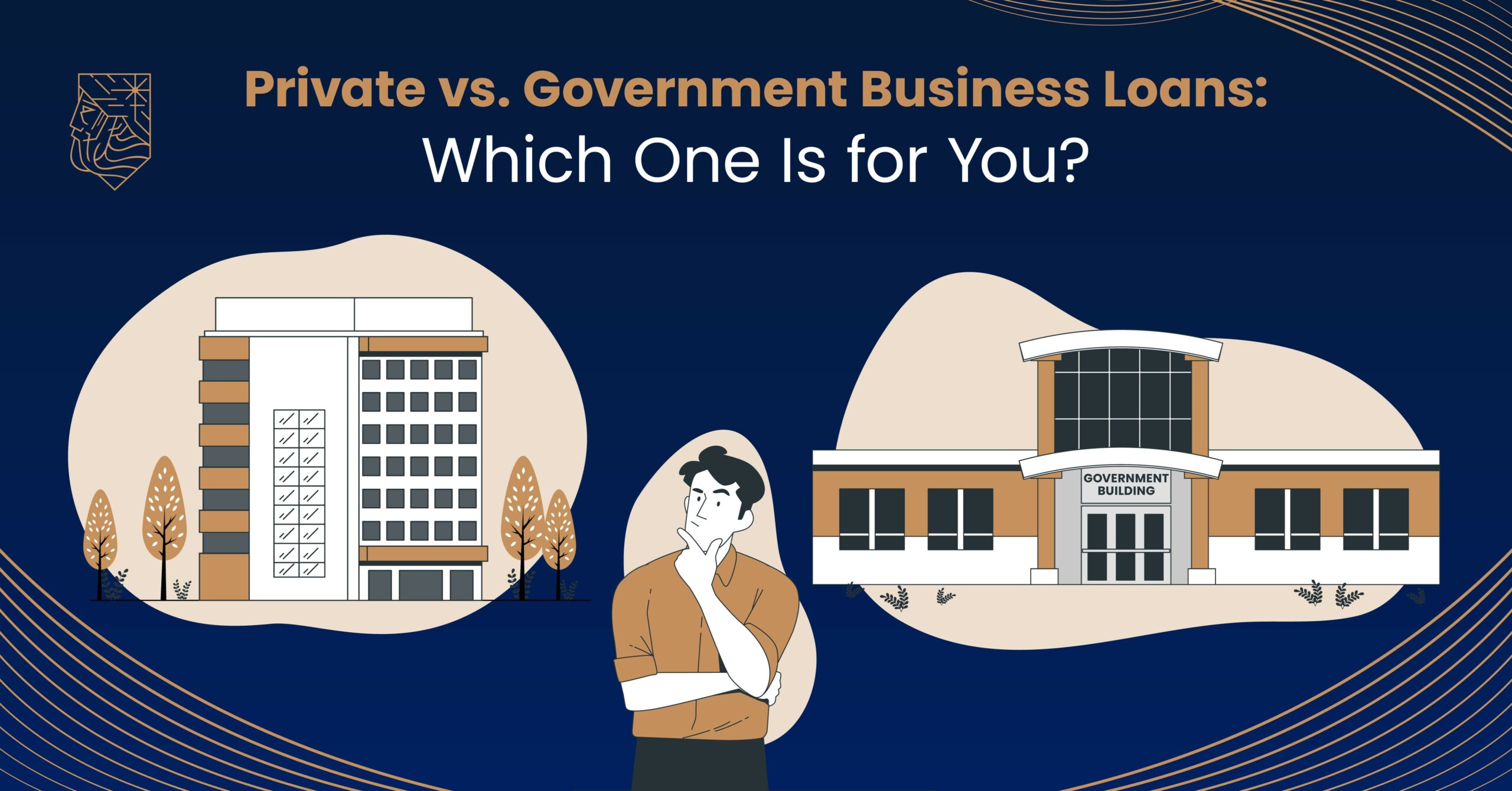Financing a company’s growth, expansion, or innovation is crucial to business success. As an entrepreneur, you understand the importance of securing sufficient funding to drive your ambitions forward.
Corporations worldwide have long recognized business loans as a highly effective way to obtain the necessary capital for achieving their goals. The global debt of nonfinancial corporations has grown steadily and recently hit a peak of $89.31 trillion in Q1 2022. This figure indicates how businesses across industries heavily rely on loans to support their operations.
However, with many loan options and business loan banks available, choosing a business financing option that aligns with your requirements is imperative. The two prominent choices in the Philippines are private and government business loans. This article explores and compares these two loan types to equip you with the knowledge to select the best option for your enterprise and give you tips to improve getting a business loan.
What are Private Business Loans?
Private business loans are loans offered by private financial institutions or lenders to businesses for various purposes, such as working capital, equipment acquisition, or expansion initiatives. Unlike government loans, private business loans aren’t backed by government programs or agencies. Instead, they rely on the lender’s funds and lending criteria.
Corporate business loans come in many forms, though the most popular are term loans and revolving credit lines. Term loans involve receiving a lump sum that you must repay through regular installments. Meanwhile, revolving credit lines are like credit cards that charge interest only based on the borrowed amount.
Advantages of private business loans
Private business loans offer several benefits that can significantly benefit entrepreneurs and their enterprises, including:
- Faster processing time for loan applications
- Flexibility in loan terms and repayment options
- Higher loan amounts available to eligible borrowers
Disadvantages of private business loans
However, private business loans also come with certain drawbacks, such as:
- Higher interest rates versus government loans
- Stricter credit requirements
- Shorter repayment terms than government loans
What are Government Business Loans?
Government business loans are financial aid government agencies provide to support businesses to help promote economic growth, job creation, and the development of target industries. They typically offer more favorable terms and conditions than private loans.
Renz Estrella, President of Zenith Capital, shares, “…The government loan programs in the Philippines have shifted towards more targeted loan programs designed to address specific challenges faced by small businesses.”
Today, one of the leading government loan programs for small businesses in the country is the Pondo sa Pagbabago at Pag-Asenso (P3). This initiative targets micro-enterprises with total assets not exceeding ₱3 million. P3 offers loans with a combined monthly interest rate and service charge of less than 2.5%. Eligible borrowers under P3 can get loans of up to ₱100,000.
Enterprises can also partake in the MSME Credit Guarantee Program of the Philippine Guarantee Corporation. This program has a government guarantee of up to half of the principal amount of a loan from a partner bank. Loan terms typically range from one to five years.
Advantages of government business loans
Because government loans are typically not for profit, they come with unique perks, like:
- Lower interest rates compared to private loans
- Extended repayment periods for easier debt management
- Flexible payment options such as interest-only periods or deferred payments
Estrella adds, “The trend has also been towards more digital and online application processes,” which makes the entire ordeal as smooth as possible.
Disadvantages of government business loans
Of course, the benefits of government loans come with drawbacks as well, including:
- Significantly stricter eligibility requirements
- Longer processing time than private loans
- Limited funding or targeted toward specific industries or regions
“Overall, government loan programs have had a positive impact on small business owners in the Philippines by increasing access to financing and supporting their growth and development,” Estrella says. “However, more targeted and flexible loan programs are needed to meet the diverse needs of small business owners in the country.”
Private vs. Government Business Loans: Factors to Consider
When deciding between private and government business loans, you need to consider several crucial factors, such as:
1. Eligibility criteria
Private business loans may have more flexible eligibility requirements, making them accessible to a broader range of businesses. Private lenders typically evaluate credit scores, business revenue, and profitability.
On the other hand, government loans often have specific criteria that businesses must meet, such as the industry of operation, company size, or geographical location. They may prioritize ventures in particular sectors to stimulate economic development.
2. Interest rates
Interest rates are a primary deciding factor of the overall cost of borrowing and the overall financial burden on your business. Private business loans often have higher interest rates than government loans because they take on more risk.
Conversely, government loans provide favorable interest rates to support businesses and the economy. Government agencies may subsidize the interest rates or offer loans at below-market rates to promote their goals.
3. Repayment terms
Repayment terms are the duration and structure of the loan repayment. You can expect government loans to offer longer repayment terms than private loans. The longer periods offered by government loans allow businesses to spread out their payments over an extended period, resulting in lower monthly installments and more practical cash flow management.
Private business loans have shorter repayment terms, which gives the tradeoff of higher monthly payments but faster loan payoff. A shorter repayment period may be desirable if your business can handle the higher rates.
As Estrella says, one of the misconceptions about business loans is that “Government loans are always better than private loans because of the lower interest rates.” In reality, “While it’s true that government loans often have lower interest rates than private loans, private loans may offer more flexible repayment terms or faster access to funds, which may be important to some business owners.”
4. Application process and requirements
The application process and requirements vary wildly between private and government business loans.
While private business loans are typically more streamlined, they can also involve stricter credit requirements and may require collateral to secure the loan. In contrast, government business loans can entail more extensive documentation and verification processes, which can take significantly longer.
“It’s important to research the specific loan program and lender to understand the requirements and ensure that you meet them before applying,” Estrella emphasizes.
Which to pick?
Government loans may be more suitable for businesses in industries or regions targeted by specific loan programs. They typically offer specialized support and favorable terms. For example, agriculture businesses can apply to the Agri-Negosyo Loan Program (ANYO) for expert assistance and guidance on top of the provided capital.
Meanwhile, established businesses with sufficient capital and a strong credit score can opt for private business loans instead. These loans often have faster processing times and can be an ideal option for companies that don’t meet the eligibility criteria of available government programs, providing quick loans for a broader range of applicants.
As a reminder, Estrella notes, “Small business owners can take several steps to prepare themselves to apply for a business loan in the Philippines, regardless of whether they are considering a private or government loan.” These include:
- Reviewing and improving credit score: Business owners should review their credit score and credit history to identify any issues that need to be addressed. They can do this by paying bills on time, reducing debt, and disputing any errors on their credit report.
- Gathering necessary documents: Business owners should gather all the documents and information required for their loan application. This may include financial statements, tax returns, business plans, and other relevant documents.
- Researching loan options: Business owners should compare different private and government loan options to identify the best fit for their business needs.
- Building relationships with lenders: Business owners should build relationships with potential lenders by networking, attending industry events, and contacting lenders directly. This can help them establish trust and credibility with lenders, improving their chances of loan approval.
“By taking these steps, small business owners can improve their chances of being approved for a loan and securing the financing they need to grow their business,” he mentions.
Find Your Financial Fit
Choosing the right business loan is paramount for your company’s financial success. Whether you opt for a private or government loan, understanding the critical differences between the two can help you find your financial fit. It would be best to assess your business loan industries, unique needs, goals, and situation before you decide.
If you’re looking for business loans in the Philippines, consider partnering with Zenith Capital! We’re a premier private lending company in the Philippines that facilitates quick and easy-to-access business loans and commercial loan to Philippine SMEs and corporations.
Contact us to learn about our flexible loan terms, or apply today! If you’re interested, you can also be one of us. Check out our freelance sales agent job description.

Rizza Templonuevo is not just an accomplished finance professional and business leader, but also a loving wife and a dedicated mother of two. With a passion for helping businesses grow and thrive, she brings her extensive knowledge and expertise as Vice President of Zenith Capital Credit Group Corporation to help countless SMEs and corporations across the Philippines access the financing they need to succeed.
When she’s not busy with work, Rizza enjoys immersing herself in the worlds of fashion and social events, as well as traveling to new and exciting places.


